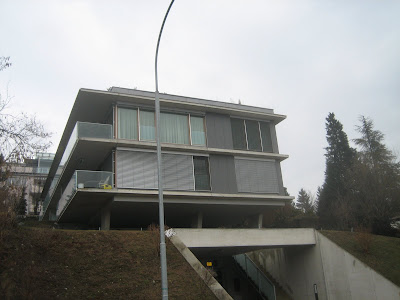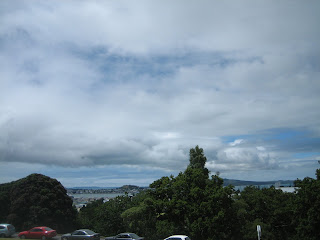 The above treats were sampled and shared recently at the "finale" restaurant in Cambridge, Massachusetts with a friend who was visiting from Hong Kong.
The above treats were sampled and shared recently at the "finale" restaurant in Cambridge, Massachusetts with a friend who was visiting from Hong Kong.Happy New Year!









 I came across a very interesting dissertation on music supply chains that was successfully defended for a Masters degree recently in Bergen, Norway at NHH. The dissertation, written by Brandeis Bellamy, is entitled: How Has the Changing Demand for Downloadable Music Influenced the Strategic Business Models of Firms? and it can be accessed here. I thought to myself, what a fascinating application of supply chains and a topic that anyone (and especially college students) can relate to. I couldn't help but read the dissertation and was really surprised and pleased to see that my Supply Chain Network Economics book was cited in it. I wrote this book while I was a Fellow at the Radcliffe Institute for Advanced Study at Harvard in 2005-2006. Coincidentally, Elaine Chew, who is an outstanding pianist and an operations researcher, who studies music from a mathematics perspective, was a Fellow at Radcliffe in 2007-2008, and we had the pleasure of having her speak at the Isenberg School in our INFORMS Speaker Series that Fall.
I came across a very interesting dissertation on music supply chains that was successfully defended for a Masters degree recently in Bergen, Norway at NHH. The dissertation, written by Brandeis Bellamy, is entitled: How Has the Changing Demand for Downloadable Music Influenced the Strategic Business Models of Firms? and it can be accessed here. I thought to myself, what a fascinating application of supply chains and a topic that anyone (and especially college students) can relate to. I couldn't help but read the dissertation and was really surprised and pleased to see that my Supply Chain Network Economics book was cited in it. I wrote this book while I was a Fellow at the Radcliffe Institute for Advanced Study at Harvard in 2005-2006. Coincidentally, Elaine Chew, who is an outstanding pianist and an operations researcher, who studies music from a mathematics perspective, was a Fellow at Radcliffe in 2007-2008, and we had the pleasure of having her speak at the Isenberg School in our INFORMS Speaker Series that Fall.
 It's the season of baking and what could be more fun before the end of the semester projects, presentations, and finals than to explore one's creativity in other ways. Once Thanksgiving is over and the turkey is fully digested, my daughter and I begin our holiday tradition of baking cookies for neighbors. This is quite the logistical operation, since we like to always include our tried and true recipes as well as to explore new ones. This year's cookie plates include: coconut chocolate-dipped macaroons, pecan shortbread logs, almond cookies with cherries, shortbread cookies, walnut rumballs, and what we call stained glass cookies (in star formation above), which are my daughter's specialty.
It's the season of baking and what could be more fun before the end of the semester projects, presentations, and finals than to explore one's creativity in other ways. Once Thanksgiving is over and the turkey is fully digested, my daughter and I begin our holiday tradition of baking cookies for neighbors. This is quite the logistical operation, since we like to always include our tried and true recipes as well as to explore new ones. This year's cookie plates include: coconut chocolate-dipped macaroons, pecan shortbread logs, almond cookies with cherries, shortbread cookies, walnut rumballs, and what we call stained glass cookies (in star formation above), which are my daughter's specialty.
 Teaching my transportation & logistics class is always an incredible experience! Today, I shared with my students the New York Times OpEd piece by Bob Herbert, What the Future May Hold, in which he writes: We're trundling along in the infrastructure equivalent of a jalopy, with bridges rotting and falling down, while other nations, our competitors in the global economy, are building efficient, high-speed, high-performance infrastructure platforms to power their 21st-century economies. Herbert then proceeds to imagine an America with rebuilt and healthy metropolitan areas, efficient rail and electric power networks, coupled with world-class public schools. He cites both a Brookings study and Rohatyn's recent book, Bold Endeavors, with the opening sentence: The nation is falling apart -- literally.
Teaching my transportation & logistics class is always an incredible experience! Today, I shared with my students the New York Times OpEd piece by Bob Herbert, What the Future May Hold, in which he writes: We're trundling along in the infrastructure equivalent of a jalopy, with bridges rotting and falling down, while other nations, our competitors in the global economy, are building efficient, high-speed, high-performance infrastructure platforms to power their 21st-century economies. Herbert then proceeds to imagine an America with rebuilt and healthy metropolitan areas, efficient rail and electric power networks, coupled with world-class public schools. He cites both a Brookings study and Rohatyn's recent book, Bold Endeavors, with the opening sentence: The nation is falling apart -- literally. This week we are celebrating International Education Week and our atrium is decorated with flags from around the world. The timing is perfect since tomorrow we will be helping to host a delegation from China that is exploring the establishment of a partnership with our doctoral program at the Isenberg School of Management. Travel and study abroad enriches all the participants and is one of the highlights of education.
This week we are celebrating International Education Week and our atrium is decorated with flags from around the world. The timing is perfect since tomorrow we will be helping to host a delegation from China that is exploring the establishment of a partnership with our doctoral program at the Isenberg School of Management. Travel and study abroad enriches all the participants and is one of the highlights of education.
